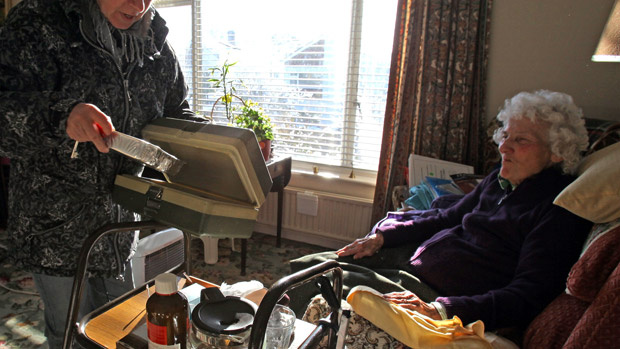Radical review proposes free social care and NHS merger
Commission proposes rise in National Insurance to fund social care for people with 'critical' needs

A free daily email with the biggest news stories of the day – and the best features from TheWeek.com
You are now subscribed
Your newsletter sign-up was successful
Social care should merge with the NHS and be provided free at the point of use, a landmark blueprint for the health and care system has proposed.
The independent review, set up by the King's Fund think-tank and chaired by business economist Dame Kate Barker, has been billed as the most radical shake-up of Britain's health and care system since 1948.
With the rise in long-term illnesses and the ageing population, Barker says the system put in place 66 years ago is simply "not fit to provide the kind of care we need and want".
The Week
Escape your echo chamber. Get the facts behind the news, plus analysis from multiple perspectives.

Sign up for The Week's Free Newsletters
From our morning news briefing to a weekly Good News Newsletter, get the best of The Week delivered directly to your inbox.
From our morning news briefing to a weekly Good News Newsletter, get the best of The Week delivered directly to your inbox.
The NHS is currently free at the point of need, but costs for care homes and home support for the elderly and chronically ill is means-tested.
Barker has called for free social care for people whose needs are "critical", expanding the free service to those with "substantial" needs once the economy improves. The move would be funded by a rise in National Insurance contributions and less generous benefits for pensioners.
"We propose radical change, greater than any since 1948, that would bring immense benefit to people who fall between the cracks between means-tested social care and a free NHS," says Barker.
This would be partly funded by:
A free daily email with the biggest news stories of the day – and the best features from TheWeek.com
- Scrapping the current prescription exemptions for groups such as pensioners, children and pregnant women. However, Barker recommends that prescription costs are reduced from £8.05 to around £2.50, with an annual cap for individuals and exemptions for people on low incomes.
- Limiting free TV licences and winter fuel payments to older people, with only those on pension credit receiving the benefits.
- A one per cent increase in National Insurance contributions for those aged over 40 and anyone earning more than £42,000.
A Department of Health spokeswoman suggested there were no plans for the measures to be introduced, but the Financial Times says Barker's calls will "fuel a wider debate on the affordability of a universal health service as the issue moves centre stage in the run-up to next year's general election".
-
 How to navigate dating apps to find ‘the one’
How to navigate dating apps to find ‘the one’The Week Recommends Put an end to endless swiping and make real romantic connections
-
 Elon Musk’s pivot from Mars to the moon
Elon Musk’s pivot from Mars to the moonIn the Spotlight SpaceX shifts focus with IPO approaching
-
 ‘Hong Kong is stable because it has been muzzled’
‘Hong Kong is stable because it has been muzzled’Instant Opinion Opinion, comment and editorials of the day
-
 A real head scratcher: how scabies returned to the UK
A real head scratcher: how scabies returned to the UKThe Explainer The ‘Victorian-era’ condition is on the rise in the UK, and experts aren’t sure why
-
 How dangerous is the ‘K’ strain super-flu?
How dangerous is the ‘K’ strain super-flu?The Explainer Surge in cases of new variant H3N2 flu in UK and around the world
-
 The ‘menopause gold rush’
The ‘menopause gold rush’Under the Radar Women vulnerable to misinformation and marketing of ‘unregulated’ products
-
 How the care industry came to rely on migrant workers
How the care industry came to rely on migrant workersThe Explainer Government crackdown on recruiting workers abroad risks deepening care sector crisis, industry leaders warn
-
 Could medics' misgivings spell the end of the assisted dying bill?
Could medics' misgivings spell the end of the assisted dying bill?Today's Big Question The Royal College of Psychiatrists has identified 'serious concerns' with the landmark bill – and MPs are taking notice
-
 Washwood Heath: Birmingham's pioneering neighbourhood health service
Washwood Heath: Birmingham's pioneering neighbourhood health serviceIn the Spotlight NHS England chair says there is a 'really good argument this is the model for the future'
-
 The UK's first legal drug consumption room
The UK's first legal drug consumption roomThe Explainer 'Potentially transformative moment in UK drugs policy' as The Thistle opens in Glasgow
-
 How can the UK solve the adult social care crisis?
How can the UK solve the adult social care crisis?Today's Big Question New commission announced to turn our buckling care sector around: yet more delay or finally a way forward?